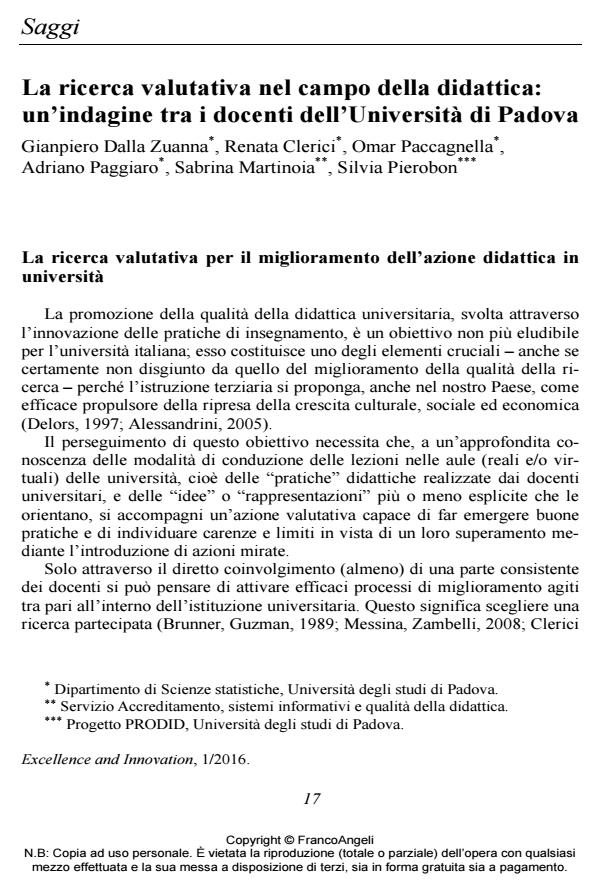La ricerca valutativa nel campo della didattica: un’indagine tra i docenti dell’Università di Padova
Titolo Rivista EXCELLENCE AND INNOVATION IN LEARNING AND TEACHING
Autori/Curatori Gianpiero Dalla Zuanna, Renata Clerici, Omar Paccagnella, Adriano Paggiaro, Sabrina Martinoia, Silvia Pierobon
Anno di pubblicazione 2016 Fascicolo 2016/1
Lingua Italiano Numero pagine 18 P. 17-34 Dimensione file 71 KB
DOI 10.3280/EXI2016-001002
Il DOI è il codice a barre della proprietà intellettuale: per saperne di più
clicca qui
Qui sotto puoi vedere in anteprima la prima pagina di questo articolo.
Se questo articolo ti interessa, lo puoi acquistare (e scaricare in formato pdf) seguendo le facili indicazioni per acquistare il download credit. Acquista Download Credits per scaricare questo Articolo in formato PDF

FrancoAngeli è membro della Publishers International Linking Association, Inc (PILA), associazione indipendente e non profit per facilitare (attraverso i servizi tecnologici implementati da CrossRef.org) l’accesso degli studiosi ai contenuti digitali nelle pubblicazioni professionali e scientifiche.
This work aims at illustrating to illustrate the design and the first results of a survey which involved 1849 university professors who were teaching courses at Bachelor's and Master's Degrees of University of Padova during the academic year 2012/13. The research is part of a project of improvement of the academic educational innovation and the quality of academic teaching. The kind of approach is an evaluative research which was conducted within the academic organization and carried out among peers, using a quali-quantitative mixed method. The data was directly obtained using a CAWI questionnaire which was distributed to the whole teaching staff, and it was linked to administrative data related to the educational offer and students’ evaluation of teaching in the same academic year. After a preliminary analysis of the factors which affected the probability of answering to the questionnaire, the results were summarized using some indicators which showed the diffusion of good practices of teaching, support needs, beliefs, interest and availability of the respondents to discuss more extensively the questions of the survey. The results are presented considering as reference context of teaching action and learning activities the eight Schools into which the degree courses are organized. Lastly, we identified sub-groups of potential participants for the qualitative phase of the research: they were characterized by different levels of professional practice and interest in innovating university teaching and they will be the right subjects to involve in different and integrated activities directed to develop teachers’ professional competences.
Parole chiave:Teaching assessment; academic teaching; teaching innovation; edu¬cational practices; student assessment; teaching methods.
- New Statistical Developments in Data Science Francesca Bassi, Leonardo Grilli, Omar Paccagnella, Carla Rampichini, Roberta Varriale, pp.263 (ISBN:978-3-030-21157-8)
- Strumenti e dispositivi di analisi e valorizzazione della professionalità docente in Università Renata Clerici, Anna Serbati, Lorenza Da Re, in EXCELLENCE AND INNOVATION IN LEARNING AND TEACHING 0/2021 pp.31
DOI: 10.3280/exioa0-2021oa11126 - Multiple imputation and selection of ordinal level 2 predictors in multilevel models: An analysis of the relationship between student ratings and teacher practices and attitudes Leonardo Grilli, Maria Francesca Marino, Omar Paccagnella, Carla Rampichini, in Statistical Modelling /2022 pp.221
DOI: 10.1177/1471082X20949710
Gianpiero Dalla Zuanna, Renata Clerici, Omar Paccagnella, Adriano Paggiaro, Sabrina Martinoia, Silvia Pierobon, La ricerca valutativa nel campo della didattica: un’indagine tra i docenti dell’Università di Padova in "EXCELLENCE AND INNOVATION IN LEARNING AND TEACHING" 1/2016, pp 17-34, DOI: 10.3280/EXI2016-001002